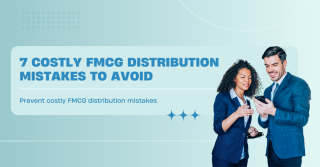FMCG Sales Automation Tools: A New Era for the Consumer Goods Sector
_1737890140.png)
FMCG sales automation tools are not just a technological upgrade—they are the catalyst for innovation, efficiency, and growth in the consumer goods industry.
In the fast-paced and ever-evolving world of Fast-Moving Consumer Goods (FMCG), sales automation tools have become the cornerstone of efficient operations. FMCG businesses must stay ahead of trends, manage vast product portfolios, and deliver goods in record time to meet consumer demand. As digital transformation continues to shape the landscape, FMCG sales automation tools are emerging as essential assets for organizations seeking to streamline operations, enhance sales performance, and achieve a competitive edge.
In this comprehensive article, we will explore the impact of FMCG sales automation tools, their benefits, types, and how businesses can implement them for maximum effect.
Understanding FMCG Sales Automation
FMCG, which stands for Fast-Moving Consumer Goods, includes products that are typically sold quickly and at a relatively low cost. Examples of FMCG products include food, beverages, toiletries, cleaning agents, over-the-counter medicines, and more. The FMCG industry is marked by high-volume, low-margin products, making efficient sales strategies critical to sustaining profitability.
Sales automation refers to the use of software tools and technologies to streamline, optimize, and automate various aspects of the sales process. These processes can include lead generation, customer relationship management (CRM), order processing, inventory tracking, and more. FMCG sales automation tools provide businesses with the necessary capabilities to reduce manual tasks, improve accuracy, and increase the overall efficiency of the sales pipeline.
Growing Need for Sales Automation in FMCG
FMCG companies face numerous challenges in the modern market, including:
-
Intense Competition: With so many brands and products available, standing out from the competition is tough.
-
Shorter Product Lifecycles: FMCG products often have short shelf lives, requiring constant replenishment and quick turnaround times.
-
Customer Expectations: Today's consumers demand personalized experiences, real-time updates, and faster deliveries.
-
Supply Chain Complexities: Managing the movement of goods from manufacturers to retail outlets can be a logistical nightmare without automation.
-
Data Overload: FMCG companies deal with massive amounts of data daily, ranging from sales metrics to customer insights. Handling this manually can be both time-consuming and error-prone.
Sales automation tools address these challenges by optimizing workflows, automating repetitive tasks, and providing actionable insights that drive smarter decision-making. By leveraging sales automation, FMCG companies can:
-
Improve sales team productivity
-
Enhance customer engagement
-
Increase sales revenue
-
Maintain better stock control
-
Gain real-time insights for data-driven decisions
Key Benefits of FMCG Sales Automation Tools
-
Improved Efficiency and Productivity One of the primary advantages of FMCG sales automation tools is their ability to free up time for sales teams to focus on high-value tasks. By automating repetitive and time-consuming tasks such as lead qualification, order management, and data entry, sales reps can focus on selling, building relationships, and closing deals.
-
Real-time Insights and Analytics Sales automation tools provide real-time visibility into sales performance, customer behaviors, and market trends. By harnessing the power of big data and AI-powered analytics, FMCG companies can make more informed decisions, predict sales patterns, and fine-tune their strategies for optimal results.
-
Personalized Customer Experiences Automation tools allow companies to segment their customer base and personalize their approach. Sales teams can tailor their messaging, offers, and recommendations to suit individual customer needs, increasing engagement and fostering brand loyalty.
-
Better Inventory Management FMCG companies must maintain a delicate balance between supply and demand to avoid stockouts or overstocking. Sales automation tools help track inventory levels, predict demand trends, and generate alerts for reorder points. This ensures a more accurate supply chain, reducing waste and lost sales opportunities.
-
Faster Order Processing and Delivery Automating the order processing system not only accelerates order fulfillment but also reduces the chance of human errors. With real-time updates and automatic invoicing, customers receive faster deliveries, which is crucial in the competitive FMCG sector.
-
Cost Reduction Automation allows FMCG companies to cut down on operational costs associated with manual processes. By reducing the need for manual intervention, automation tools reduce overhead, improve resource allocation, and allow businesses to scale without increasing costs.
Types of FMCG Sales Automation Tools
-
Customer Relationship Management (CRM) Software CRM tools are central to FMCG sales automation. These platforms help manage customer relationships by tracking interactions, preferences, and purchase histories. Some CRM tools integrate with other sales and marketing tools, enabling seamless communication across channels.
-
Order Management Systems (OMS) An OMS automates order processing, from order receipt to delivery. It streamlines tasks such as order verification, stock availability checks, and invoicing. Popular order management systems include NetSuite, TradeGecko, and Orderhive.
-
Sales Enablement Platforms Sales enablement tools equip sales teams with the resources they need to sell more effectively. These tools provide access to content libraries, product information, pricing models, and competitor insights.
-
Point of Sale (POS) Systems POS systems automate the transaction process at retail locations. These systems record sales data, manage inventory, and provide real-time analytics.
-
Inventory and Supply Chain Management Tools Inventory management tools like TradeGecko and SAP Integrated Business Planning (IBP) automate the tracking of stock levels, help forecast demand, and provide insights into supply chain performance. These tools are particularly valuable for FMCG companies operating with high-volume products and complex logistics.
-
Automated Marketing Tools These tools automate email campaigns, social media marketing, customer segmentation, and content delivery. By using platforms FMCG companies can reach larger audiences, nurture leads, and build long-term relationships without manual intervention.
-
Data Analytics and Forecasting Tools AI-powered tools that analyze historical data and predict future trends can be vital for FMCG companies. These tools help businesses make more accurate sales forecasts, plan inventory more effectively, and identify emerging market trends. Examples include Google Analytics, and Microsoft Power BI.
Implementing FMCG Sales Automation Tools
Successfully integrating sales automation tools into an FMCG organization requires careful planning and execution. Here’s a step-by-step guide for seamless implementation:
-
Identify Pain Points and Goals The first step is to assess the challenges your sales team faces and determine which processes need automation. Whether it's improving lead conversion, managing stock levels, or enhancing customer experience, clearly defining goals will help choose the right tools.
-
Select the Right Tools After identifying your needs, it’s time to choose the sales automation tools that align with your business goals. Consider factors such as ease of integration, scalability, cost, and user-friendliness. You may opt for an all-in-one solution or combine various specialized tools to meet your requirements.
-
Train Your Sales Team Ensure that your sales team is adequately trained on the new automation tools. A well-trained team can maximize the potential of the tools, leading to improved productivity and results.
-
Integrate with Existing Systems Ensure the automation tools integrate seamlessly with your existing CRM, ERP, and inventory management systems. Integration will allow data to flow freely across platforms and improve overall efficiency.
-
Monitor and Optimize Once the tools are in place, continuously monitor performance. Leverage the insights provided by these tools to optimize your processes and refine your strategies over time.
Future Trends in FMCG Sales Automation
As technology continues to advance, the future of FMCG sales automation looks promising. Some emerging trends include:
-
Artificial Intelligence and Machine Learning: AI and ML algorithms will drive predictive analytics, personalization, and demand forecasting, enabling businesses to make even more data-driven decisions.
-
Voice Commerce: Voice-activated tools like Amazon Alexa are expected to play a larger role in FMCG sales as more consumers turn to voice-based shopping.
-
Robotic Process Automation (RPA): RPA will further streamline back-office functions, improving operational efficiency and reducing errors in processes like inventory management and order fulfillment.
-
Blockchain Technology: Blockchain’s potential to enhance transparency and security within supply chains may become an important aspect of FMCG sales automation, especially in tracking product provenance and preventing fraud.
Conclusion
FMCG sales automation tools have proven to be game-changers in an industry where efficiency and speed are paramount. By automating key sales processes, companies can boost productivity, improve customer experiences, reduce operational costs, and ultimately drive revenue growth. As the market continues to evolve, adopting the right sales automation tools will be crucial for staying competitive in the ever-changing FMCG landscape.
By understanding the different types of fmcg sales automation tools available and effectively implementing them, FMCG businesses can unlock their full potential and capitalize on the opportunities of the future.
FAQs
1. What are FMCG Sales Automation Tools?
FMCG sales automation tools are software solutions that automate and streamline various sales processes, including lead generation, order management, customer relationship management, inventory tracking, and reporting, helping FMCG companies improve efficiency and productivity.
2. How can FMCG Sales Automation Tools benefit my business?
These tools can improve sales productivity, reduce manual errors, provide real-time insights into performance, optimize inventory management, and enhance customer engagement, ultimately driving sales growth and cost reduction.
3. Which FMCG Sales Automation Tool should I use?
Choosing the right tool depends on your specific business needs. Some popular tools include Salesforce for CRM, TradeGecko for inventory management, and Mailchimp for marketing automation. Evaluate tools based on ease of integration, scalability, and cost.
4. Can FMCG Sales Automation Tools help with customer engagement?
Yes, sales automation tools allow businesses to segment customers and deliver personalized experiences, from tailored marketing messages to custom product recommendations, leading to higher engagement and brand loyalty.
5. What is the future of FMCG Sales Automation?
The future of FMCG sales automation will likely see the increased adoption of AI, machine learning, and blockchain to enhance predictive analytics, personalize experiences, and streamline supply chains, further improving efficiency and customer satisfaction.








